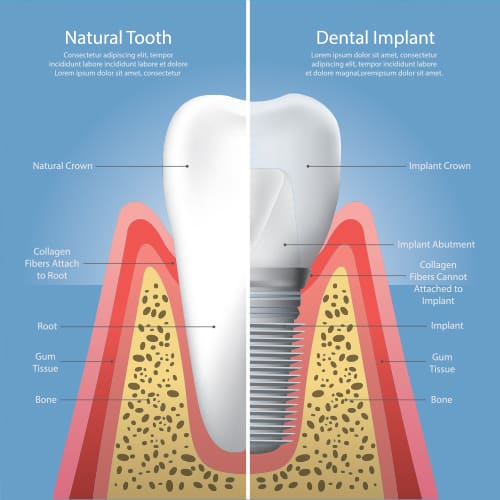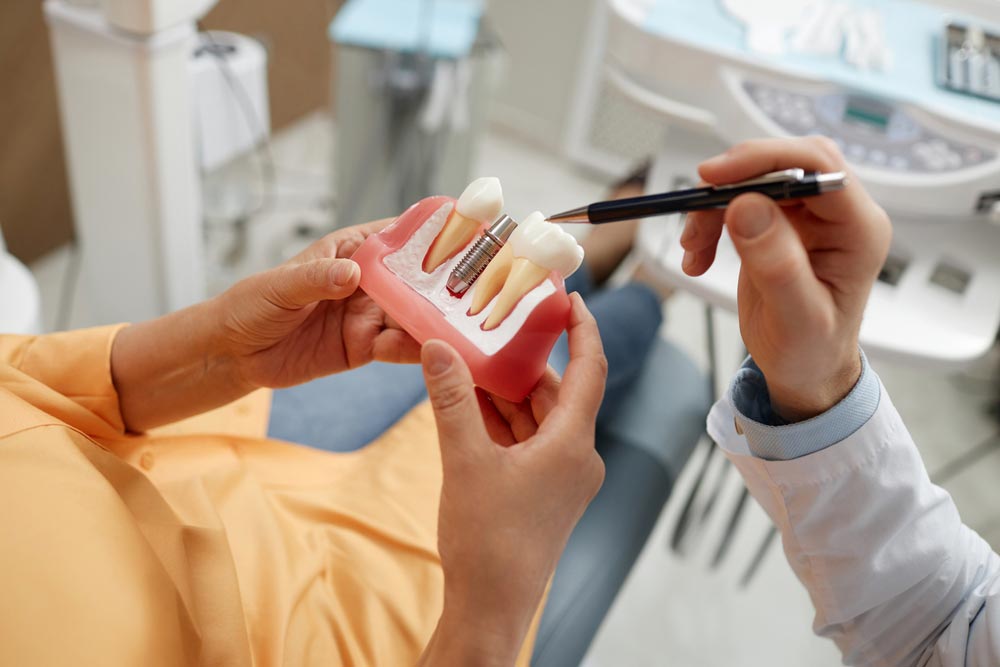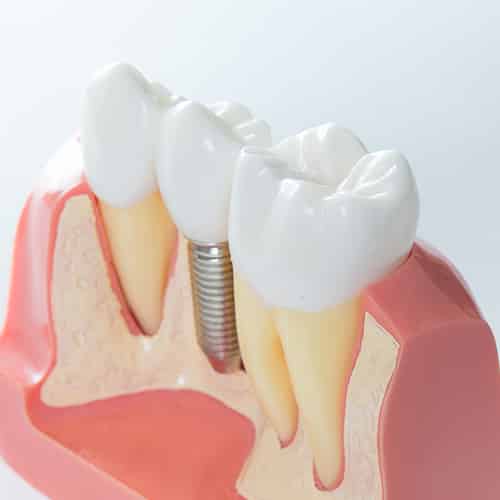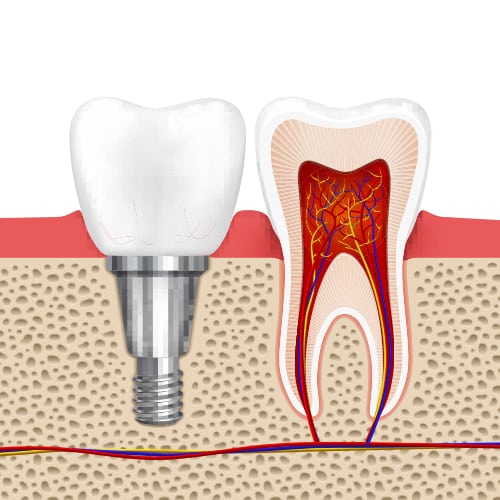Is having missing teeth starting to impact on your ability to chew, speak or smile?
Visit the team at Pain Free Dental Clinic to arrange your new dental implants! We have been providing comprehensive dental services for patients in Moss Vale and the Southern Highlands community since 2014. We strive to live up to our name by providing all our patients a comfortable and stress-free clinic experience.
Our principal dentist Dr Nikgoo is an accredited member of the Australian Society of Implant Dentistry. He also holds a Doctor of Dental Surgery, Graduate Diploma of Dental Implantolgy (CSU)) and the International Congress of Oral Implantologists Mastership.
Feel confident in our skills, and call to book an appointment today!
Losing even a single tooth can affect your bite. The loss of a natural tooth can be caused by an accident, or lack of maintenance over time resulting in tooth decay. Sadly, adult teeth cannot grow back after extraction, leaving you with an empty gap.
When a natural tooth is missing, the teeth on either side of the gap can shift and move, causing you to develop a bad bite. Irregular bites are more likely to develop tooth decay and gum disease, because bacteria can build up in areas that are often missed through daily brushing.
A dental implant will fill in the gap and keep your existing natural teeth in place. By having a full set of teeth, your jawline will be fully supported, allowing you to speak and eat as per usual.


There are two types of dental implants that are used depending on individual requirements:
To ensure your safety and comfort, your dentist will carefully inspect your jaw through visual examination and x-rays. At Pain Free Dental Clinic, we are committed to providing our patients a stress-free dental experience. We will run you through the entire procedure for your peace of mind. If you are feeling nervous or anxious, our team can provide you with a range of sedatives including happy gas and conscious sedation.
During the procedure, a hole is drilled into the jawbone, and a titanium screw is placed inside. The implant needs to be left in the jaw bone for four to six months. This will allow the screw to fuse into your bone tissue, ready to hold your permanent crown securely for day to day living.

Like any dental procedure, there may be elements of pain and discomfort, but this can be managed and minimised.
In the first 24 hours after a tooth implant is placed, the gums tend to swell slightly. In this stage, the gums are tender, and you may have inflammation, making it slightly difficult to eat.
After a surgical procedure, it is imperative to stay hydrated and to get plenty of rest. Take care not to put too much pressure on the dental implant by brushing your natural teeth or temporary crowns gently.
Dental implants can cause pain if they become infected, which is preventable by practising good oral hygiene. You should consult your dentist if you notice any symptoms of infection. When necessary, your dentist will prescribe an antibiotic.Also ,Your dentist will prescribe Special mouth wash if it is needed. As a result, your mouth will be free of bacteria and you should avoid infection.
Regular maintenance can contribute to the longer life of your dental implants. You can follow these simple steps to maintain them:

Your dental implant will feel just like your natural teeth. You will need to maintain daily oral hygiene practices as they will wear out if not properly taken care of.
Whilst dental implants are a great permanent solution for missing teeth, if you don’t want to wait a few months for your permanent crown, we can also provide dental bridges. A dental bridge is a faster solution as the process can be completed in just two weeks however it involves preparing (cutting) the adjacent teeth.


If you’re unsure of what type of dental implant is best suited for you, our principal dentist, Dr Nikgoo, will be more than happy to help.
Every new patient at Pain Free Dental Clinic is provided with an initial hour appointment, where we will inspect your teeth, gums and jaw.
We can answer any concerns you may have and put your mind at ease. Our team can also organise payment plans through Zip Money for your convenience.
If you have any further questions regarding dental implants or other dental services such as fillings or teeth whitening, visit our blog or FAQ page for more information.
Dental implants can be utilized for a variety of reasons. Your teeth might be missing or severely broken, or you could consider implants as a more permanent alternative to removable dentures.
You may have lost one or more teeth due to severe gum disease (periodontitis), or you may have experienced trauma that left you with missing teeth.
Getting dental implants can help restore oral health, whatever your reason for needing them.
Implants are commonly made of titanium, which is biocompatible with the body and serves as a sturdy, long-lasting foundation for replacing teeth. The natural bone fuses with and attaches to the implant, locking it into place.
As a result of osseointegration, implant-supported teeth become stable and strong enough to support replacement teeth, withstand daily use, and work like natural teeth. Implants, when they are fully integrated, will be like your own teeth. If you take a very good care of them, you can keep them for a very long time, even life time.
After tooth loss, dental implants allow you to reclaim your lifestyle and achieve overall wellness. Patients who have lost teeth benefit from dental implants since they provide aesthetic and functional improvements. By replacing a missing tooth with a dental implant, you can:
Almost all patients experience a significant improvement in their chewing ability. Furthermore, patients also notice a change in the appearance of their smiles.
There are a number of criteria that must be met in order to qualify for dental implants. Health problems may prevent you from having adequate jaw bone mass. You may still be unable to get implants if you have health problems that don’t affect your bone mass.
Smokers or patients with gum disease, for example, may or may not be eligible for implants. You might not be able to get a successful implant procedure if you suffer from these conditions and other health problems.
Typically, the procedure can range from a single session for a simple case to several months for complex situations, with intervals for healing and recovery. The duration of the procedure may vary based on:
After dental implant surgery, patients may experience:
These symptoms generally subside within a few days or a week. A soft diet and pain medication may be recommended by your dentist to manage discomfort.
Yes, dental implants can replace a single tooth, multiple teeth or even a full upper or lower set of teeth. For multiple missing teeth, implant-supported bridges can be a consideration.
As with any surgery, dental implant procedures carry some risks, including infection at the implant site, injury to surrounding structures, nerve damage and sinus problems. However, complications are relatively rare and, when they do occur, are typically mild and easily treatable.
Yes, dental implants function like your natural teeth, allowing you to eat a wide variety of foods without discomfort. They also help in maintaining the natural shape of your face and improving clarity of speech, which is often impaired by missing teeth.
As with any dental procedure, your personal circumstances and health history play an important role in the decision-making process. Consult with our dentist to make an informed decision regarding dental implants.